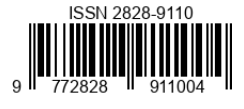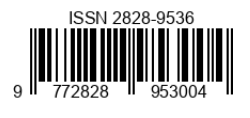TRANSAKSI DIGITAL DAN PERKEMBANGAN e-TOURISM DI INDONESIA
DOI:
https://doi.org/10.56910/nawasena.v1i2.157Keywords:
information, digital, e-tourism, technology, payment, transactionAbstract
The rapid development of information technology, especially during the pandemic, has led to a significant increase in digital transactions carried out by the public. The concept of “clean, health, and safety” is included in the aspect of the payment system that minimizes physical contact in transactions, which is one of the causes of the increase in digital transactions during the pandemic. Digitalization of the payment system is considered to be the key to boosting the national economic recovery. This research uses the descriptive qualitative method. Several works of literature relevant to the research topic were used as data sources, and in-depth interviews and brief observations were conducted to obtain data. E-tourism is closely related to the development of information technology. The development of information technology has not accompanied the magnitude of digital transactions in Indonesia. There is a high correlation between the number of sites and the number of tourist visits, so the number of tourism websites in Indonesia should be increased. In addition to the added amount, it is also necessary to add digital payment features that make it easier.
References
Buku
Bungin, M. B. (2007). Penelitian Kualitatif: Komunikasi, Ekonomi, Kebijakan Publik, dan Ilmu Sosial Lainnya. Jakarta: Kencana Prenada Media Group.
D. Buhalis, R. E. (2008). eTourism Case Studies: Management and Marketing issues in eTourism. Butterworth-Heinemann: Oxford.
H. Werthner, S. K. (1999). Information Technology and Tourism: A Challenging Relationship. Vienna: Springer.
Putu Ika Wahyuni, d. (2021). Investasi Pariwisata Indonesia. Makasar: CV. Tohar Media.
Singarimbun, M. d. (1989). Metode Penelitian Survai. Jakarta: LP3S.
Sugiyono. (2017). Metode penelitian kuantitatif, kualitatif dan R&D. Bandung: Alfabeta.
Jurnal
Ahmad Murtadho, M. R. (2011). Analisis Situs E-Tourism Indonesia: Studi Terhadap Persebaran Geografis, Pengklasifikasian Situs Serta Pemanfaatan Fungsi dan Fitur. Journal of Information Systems, Volume 7, Issues 1, 13-25.
Andeka Rocky Tanaamah, A. D. (2006). Kepariwisataan Berbasiskan E-Tourism di Indonesia. Jurnal Teknologi Informasi-Aiti, Vol.3 No. 1, 1-74.
Betty Silfia Ayu Utami, A. K. (2021). Sektor Pariwisata Indonesia di Tengah Pandemi Covid 19. JDEP-Jurnal Dinamika Ekonomi Pembangunan 4 (1), 8-14.
Deegan, C. (2002). Introduction: The legitimising effect of social and environmental disclosures – a theoretical foundation. Accounting, Auditing & Accountability Journal, Vol. 15 No. 3, 282-311.
Esti, N. (2020). E-Commerce: Pasar Digital dan Barang Digital. Jakarta: Universitas Mercu Buana.
Feather, N. T. (1996). Reaction to penalties for an offense in relation to autoritarianism, values, perceived responsibility, perceived seroiusness and deservingness. Journal of Personality and Social Psychology, 71, 571-587.
J. Neidhardt, H. W. (2018). IT and tourism: still a hot topic, but do not forget IT. Inf Technol Tour 20(1–4):1–7, 1-7.
Ulrike Gretzel, e. (2022). e Tourism Beyond COVID 19: A Call for Transformative Research. Information Technology & Tourism (2020) 22, 187-203.
Velina Kazandzhieva, H. S. (2019). E-tourism: Definition, development and conceptual framework. Tourism (13327461) . 2019, Vol. 67 Issue 4, 332-350.
WONG, A. T.-T. (2020). E-Tourism: How Customers Intention to use be Affected? Academy of Marketing Studies Journal Vol: 24 Issue: 4, 1-12.
Sumber Elektronik
Departemen Komunikasi Bank Indonesia. (2022, Maret 9). Retrieved from https://www.bi.go.id/id/publikasi/ruang-media/cerita-bi/Pages/Pandemi-Pendorong-Digitalisasi.aspx
Kementerian Komunikasi dan Informatika Republik Indonesia. (2022, April). Retrieved from https://www.kominfo.go.id/content/detail/40935/dorong-kinerja-perekonomian-nasional-lewat-digitalisasi-e-commerce-dan-online-travel/0/berita
Rizkinaswara, L. (2019, April 7). Retrieved from https://aptika.kominfo.go.id/2019/04/pentingnya-teknologi-dalam-sektor-pariwisata/
Skripsi/Tesis/Disertasi
Mufidah, W. U. (2018). Analisis Tingkat Kepentingan dan Kinerja Produk Wisata di Kampung Gajah Wonderland. Skripsi, Bandung: Universitas Pendidikan Indonesia.
Saputra, I. P. (2019). Analisis Efektivitas Penggunaan Digital Payment Pada Mahasiswa Institut Informatika dan Bisnis Darmajaya. Skripsi, Lampung: Institut Informatika dan Bisnis Darmajaya.
Downloads
Published
How to Cite
Issue
Section
License
Copyright (c) 2022 NAWASENA : Jurnal Ilmiah Pariwisata

This work is licensed under a Creative Commons Attribution-ShareAlike 4.0 International License.








